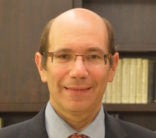There I was, one sunny Jerusalem afternoon, doing errands on Emek Refaim, in the German Colony of Jerusalem, about to hop on my bicycle with some money I had withdrawn from the bank to pay my children’s tutor, who was winding up the lesson. I saw an old friend of mine, walking with another friend of his. Both are rabbis who were attending one of the Shalom Hartman Institute’s summer seminars for rabbis. As Ed replied, “Hi Gil,” the friend asked, “Are you Gil Troy? I am Rabbi David Ingber of Romemu.”
As my kids would say: “Busted!” Jewish Week readers may recall a vigorous argument that erupted this spring, shortly before this encounter, when Robbie Gringras of Makom wrote an Opinion piece, a colorful, combative and controversial critique of a Friday-night service he attended at Romemu, an unaffiliated congregation in Manhattan grounded in a neo-chasidic post-modernism.
Gringras claimed that the hip, revivalist, love-thy-neighbor-as-thyself service he experienced on the Upper West Side felt alien to him as an Israeli. Many outraged counterattacks compelled Gringras to retreat, writing “I blew it,” apologizing for his tone and realizing, he wrote, that progressive American Jews have a hard time hearing any criticism from Israelis, given how rejected they feel by Israel’s religious establishment. Gringras’ backpedaling prompted me to plunge in, asking why activists and particularly liberal rabbis, who insist on criticizing Israeli politics, could not take any criticism of American Judaism, which once was — and still needs to be — subject to a vigorous Zionist critique.
I looked at Rabbi Ingber tentatively, cautiously, a tad defensively, preparing for an onslaught. His serve, as we say in tennis.
I don’t know what determined what happened next. Perhaps it was Jerusalem’s magical summertime atmosphere, more intellectual, spiritual, cultural party than center for party warfare, no matter what the headlines suggest. Perhaps it was our common Hartman connection. That helped, but I suspect that Rabbi Ingber just happens to be the expansive, welcoming, intellectually open and questioning personality I encountered at that moment.
“I am glad to meet you,” he said, “and would love to talk to you sometime about the article you wrote,” whereupon we proceeded to talk about it, right there on the street. I had been careful to say in my article that I had “never had the pleasure” of praying at Romemu, so I was, from the start, commenting on the commentary, not the service. Nevertheless, what could have been an unpleasant, thin-skinned interaction instead became a rich exchange about Zionism, American Jewry, openness to criticism, the question of tone, and what the rabbi called the search for neo-chasidic spirituality.
My new, instant friend — whom I would happily meet again on purpose and whose congregation I would be honored to visit — critiqued Gringras’ critique, saying the tone was too harsh while his points about seeking common spiritual ground between American Jews and Israeli Jews could have been made more accurately, effectively and constructively. I critiqued the critique of the critique, saying that I heard in the backlash a “freedom for me and not for thee” refrain I have been hearing elsewhere from American Jews; the right to criticize Israel becomes a one-way street rather than a new model of mutual learning from and about each other, which must include humility and self-criticism along with the freedom to criticize the other lovingly.
Moving beyond the article, we talked about our shared search for authentic, dynamic, intense spiritual experiences, on both sides of the Atlantic, and the need for a richer, more multi-dimensional, less fragile, robust yet respectful dialogue between American Jews and Israelis.
I returned home — having missed my kids’ tutor — from this impromptu Emek Refaim summit, impressed and inspired. As we approach the New Year, we should all learn from Rabbi Ingber’s welcome toward someone he could have treated as the enemy who “attacked” him and his congregation but instead approached as a friend. The Jewish world needs vigorous debate — part of my Zionist critique of American Jewry is that North America’s commendable politeness sometimes short-circuits the constructive prickliness that can be a catalyst for change. We need not fear disagreeing with each other — but we can learn how to disagree without being disagreeable, building a Jewish communal home large enough to contain our many visions while maintaining a solid foundation and an enduring infrastructure.
Gil Troy is professor of history at McGill University and a Shalom Hartman Engaging Israel Research Fellow. His latest book is “Moynihan’s Moment: America’s Fight Against Zionism as Racism” (Oxford University Press).
The New York Jewish Week brings you the stories behind the headlines, keeping you connected to Jewish life in New York. Help sustain the reporting you trust by donating today.





